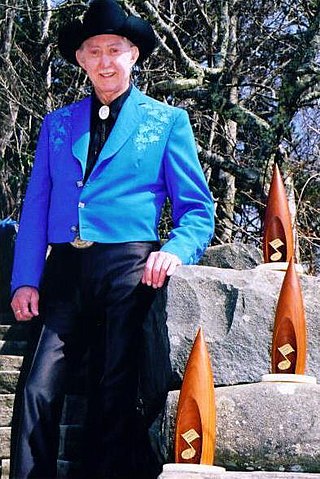
Jack Henry Greene was an American country musician. Nicknamed the "Jolly Greene Giant" due to his height and deep voice, Greene was a long time member of the Grand Ole Opry. A three-time Grammy Award nominee, Greene is best known for his 1966 hit, "There Goes My Everything". The song dominated the country music charts for nearly two months in 1967 and earned Greene "Male Vocalist of the Year", "Single of the Year", "Album of the Year" and "Song of the Year" honors from the Country Music Association. Greene had a total of five No. 1 country hits and three others that reached the top ten. Billboard magazine named Greene one of the Top 100 "Most Played Artists".
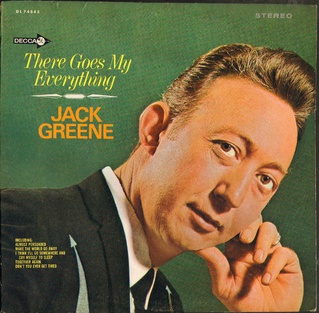
There Goes My Everything is a studio album by American country music artist Jack Greene. It was released in December 1966 on Decca Records and was produced by Owen Bradley. It was Greene's debut studio album as a recording artist after playing in the band of Ernest Tubb for several years. Three singles were included in the album. Its biggest hit was the title track, which topped the country charts in 1966 and helped jump start Greene's music career. The album itself would also reach peak positions on the Billboard country chart following its release.
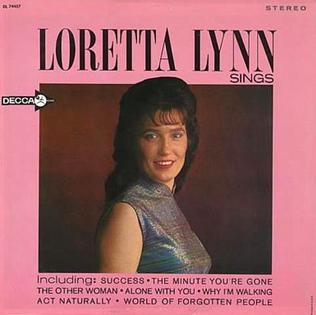
Loretta Lynn Sings is the debut studio album by American country singer-songwriter Loretta Lynn. It was released on December 9, 1963 via Decca Records and was produced by Owen Bradley. The album contained songs recorded shortly after she had signed with the Decca label. In total, four singles were released from the album. Two of these singles became major hits on the Billboard country chart. This included "Success", which became Lynn's first top ten hit. The album was received positively by critics and writers alike.

Mr. and Mrs. Used to Be is the first collaborative studio album by American country music singers Ernest Tubb and Loretta Lynn. It was released on August 2, 1965, by Decca Records.

Singin' with Feelin' is the tenth solo studio album by American country music singer-songwriter Loretta Lynn. It was released on October 9, 1967, by Decca Records.

Here I Am Again is the twenty-first solo studio album by American country music singer-songwriter Loretta Lynn. It was released on October 2, 1972, by Decca Records. The album features liner notes written by Lynn's mother, Clara Butcher, who had remarried following the death of Lynn's father, Ted Webb, in 1959. This would be Lynn's last studio album to be released under Decca Records, which would merge with MCA in 1973.

The discography of American country artist Jeannie Seely contains 16 studio albums, three compilation albums and 36 singles. Releasing several singles for the Challenge label, she moved to Nashville, Tennessee and signed with Monument Records in 1966. Releasing "Don't Touch Me" as a single, it became a major country hit, reaching number 2 on the Billboard Hot Country Singles chart. It also became her only single to reach the Billboard Hot 100, peaking at number 85. The success led to the release of her debut studio album entitled The Seely Style, which reached number 8 on the Billboard Top Country Albums chart.

Bad Seed is a studio album by American country music artist Jan Howard. It was released in November 1966 via Decca Records and featured 12 tracks. The third studio album of her recording career, Bad Seed was named for its title track, which reached the top ten of the country charts in 1966. The disc was met with a favorable review from Cashbox following its release.

Count Your Blessings, Woman is a studio album by American country music artist, Jan Howard. It was released in June 1968 on Decca Records and contained 11 tracks. Most of the disc featured covers of popular songs of the era. The album's title track was spawned as a single, becoming a top 20 song on the Billboard country chart in 1968. Additionally, the album would reach peak positions on the American country albums chart. It was reviewed positively by Billboard magazine.
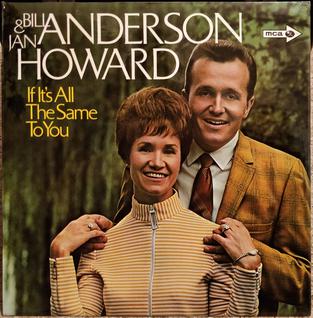
If It's All the Same to You is a studio album by American country music artists Bill Anderson and Jan Howard. The album was released on Decca Records in March 1970 and was produced by Owen Bradley. It was the pair's second collaborative album after several years of performing together on tour and on television. The album's title track became a major hit on the Billboard country chart, reaching the top 10. Additionally, the album itself would reach peak positions on the Billboard country albums chart.
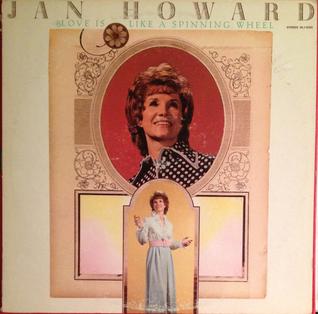
Love Is Like a Spinning Wheel is the twelfth studio album by American country artist Jan Howard. It was released in March 1972 on Decca Records and was produced by Owen Bradley. The album spawned two singles that became minor hits on the Billboard country songs chart. It was one of Howard's final studio albums for the Decca label before departing the label within a year's time.
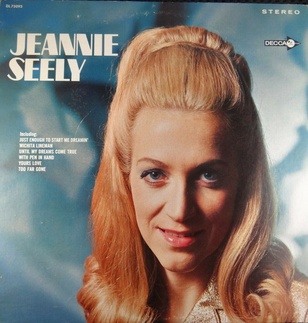
Jeannie Seely is a studio album by American country artist Jeannie Seely. Her fifth studio release, the album was released on April 7, 1969, by Decca Records and was produced by Owen Bradley. The record was Seely's first with the Decca label after recording for several years with Monument Records. Although the album was released on a major label, it did not chart on any Billboard publications upon its release.
"Wish I Didn't Have to Miss You" is a song written by Hank Cochran and Dave Kirby. It was originally and released as a duet by American country music artists Jack Greene and Jeannie Seely. Released in October 1969, the song became a major hit on the country charts in early 1970.
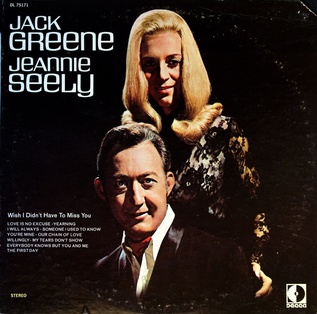
Jack Greene, Jeannie Seely is a studio album by American country music artists Jack Greene and Jeannie Seely. It was released on January 12, 1970, by Decca Records. The album was produced by Owen Bradley and Harry Silverstein. The album included the duo's first major hit single together, "Wish I Didn't Have to Miss You". Their self-titled studio album reached peak positions on the Billboard country albums chart upon its initial release.
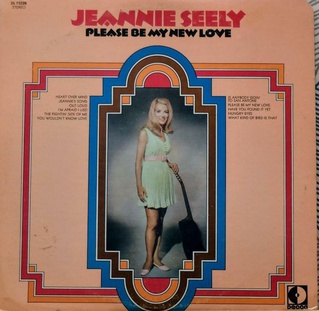
Please Be My New Love is a studio album by American country artist Jeannie Seely. Her sixth studio album, it was released on June 29, 1970, by Decca Records and was produced by Walter Haynes. The album did not reach any major chart positions, however, the project did include one charting single. Please Be My New Love was her third studio album with the Decca label.
"Much Oblige" is a song written by G. Deaton, R. Fulford and G. Simmons. It was originally and released as a duet by American country music artists Jack Greene and Jeannie Seely. Released in November 1971, the song became a major hit on the country charts in early 1972.
"What in the World Has Gone Wrong with Our Love" is a song written by Hank Cochran and Johnny Slate. It was originally and released as a duet by American country music artists Jack Greene and Jeannie Seely in July 1972.

Can I Sleep in Your Arms/Lucky Ladies is a studio album by American country music artist Jeannie Seely. It was released on November 19, 1973, by MCA Records and was produced by Walter Haynes. It was Seely's first solo studio album in three years and was her first to be issue with the MCA label. The album produced a total of six singles that were originally released between 1970 and 1973. The record is named for its two major hits: "Can I Sleep in Your Arms" and "Lucky Ladies". It would be Seely's final album for the MCA label.
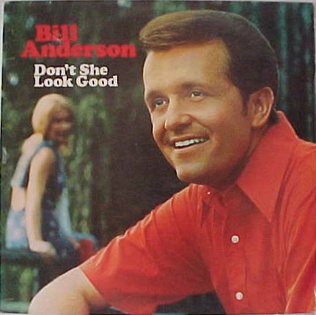
Don't She Look Good is a studio album by American country singer-songwriter Bill Anderson. It was released in November 1972 on Decca Records and was produced by Owen Bradley. The album was Anderson's twentieth studio recording to be issued. It was also his fourth studio album released in 1972. Two additional projects were collaborations with Jan Howard earlier in the year. The album's only single was the title track, which became a major hit on the country charts.

Bill is a studio album by American country singer-songwriter Bill Anderson. It was released in July 1973 on MCA Records and was produced by Owen Bradley. It was Anderson's first studio album to be released on the MCA label after Decca Records merged with the label. It was also his twenty first studio recording to be released and only album project to be issued in 1973. The album included three singles, two of which became number one hits in either the United States and Canada. The album itself also would reach peak positions on national publication charts.

















